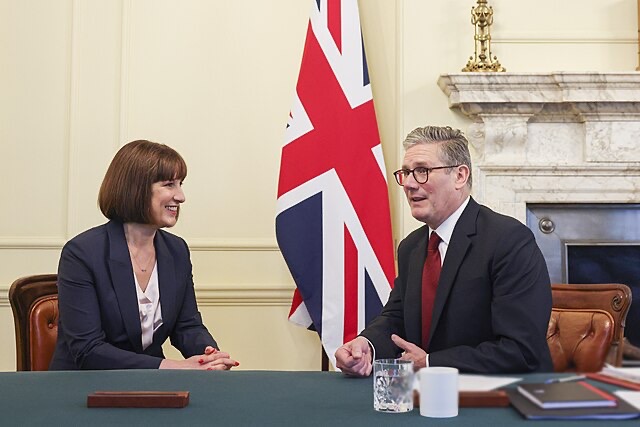Labour leader Keir Starmer moved swiftly to slap down Shadow Chancellor Rachel Reeves after she suggested that boosting trade with the European Union was more important than securing a trade deal with the United States. The public rebuke highlights the ongoing tightrope Starmer is walking as he tries to position Labour as a serious governing alternative—one that won’t alienate key allies or spook crucial voters ahead of the next general election.
The Incident That Sparked the Clash
Rachel Reeves’ Controversial Comment
During an economic policy discussion earlier this week, Rachel Reeves sparked controversy when she declared that restoring and enhancing trade ties with the European Union must be a greater priority for Britain than striking a fresh deal with the United States.
She argued that the EU remains the UK’s largest and closest trading partner and that a thriving relationship with Brussels would deliver faster, more tangible economic benefits than any prospective transatlantic agreement.
While her statement made economic sense to many analysts, politically it was a grenade—especially given the sensitivities surrounding Brexit and Britain’s future on the world stage.
How Starmer Quickly Responded
Keir Starmer wasted no time addressing the fallout.
Within hours, he clarified that Labour would not choose between Europe and America, stressing that strengthening ties with both trading partners was central to Labour’s vision for Britain’s future.
Speaking to reporters, Starmer said, “We will not favour one vital relationship over another. Good trade deals with both the EU and the United States are essential for British jobs, growth, and security.”
It was a clear attempt to reassure both pro-Brexit voters and Atlanticist allies who may have been unsettled by Reeves’ comments.
What Rachel Reeves Actually Said
Emphasizing EU Trade Over US Deals
In a panel session, Reeves stated, “Our immediate economic priority must be rebuilding strong trading relationships with our European neighbours. That’s where most of our lost growth has occurred since Brexit.”
She added that while a US trade deal remained important, the scale and immediacy of the EU opportunity outweighed the American market in practical terms.
Economically speaking, Reeves wasn’t wrong: Britain’s trade volumes with the EU still dwarf those with the United States.
However, politically, her comments opened the door for critics to accuse Labour of favouring Europe at the expense of Britain’s special relationship with Washington.
Immediate Media and Political Reaction
Conservative MPs leapt on Reeves’ comments almost instantly, portraying Labour as a party still “obsessed” with rejoining the European sphere.
Some newspapers blasted Labour for “snubbing” America’s friendship at a delicate moment when global alliances are more critical than ever.
Pro-EU voices welcomed Reeves’ frankness, arguing that Britain must face economic realities rather than cling to ideological visions of transatlantic trade.
Still, the political damage was done: Labour appeared divided at a time when message unity is crucial.
Starmer’s Pushback: Setting the Record Straight
Labour Leader’s Emphasis on Balanced Trade Strategy
Starmer’s intervention wasn’t just damage control—it was a decisive reminder that he leads the party, not individual cabinet members-in-waiting.
He reiterated Labour’s trade strategy would be pragmatic, pursuing stronger deals with both Europe and the US simultaneously.
Rejoining the single market, he emphasized, is not Labour’s goal. Instead, Labour would focus on smoothing out Brexit-related frictions and opening up new trade opportunities wherever possible.
“The British people expect their government to maximise every opportunity, whether in Paris, Berlin, or Washington,”Starmer said firmly.
Clarifying Labour’s Official Trade Stance
Labour’s current policy, as outlined by Starmer, revolves around:
- Improving and renegotiating parts of the Brexit deal to reduce barriers with the EU.
- Seeking a closer alignment on standards without formally rejoining.
- Simultaneously pushing for a comprehensive trade agreement with the United States.
- Supporting trade deals with emerging markets and Commonwealth nations.
The aim is to rebuild Britain’s battered trade network post-Brexit without reigniting the divisive membership debates of the past.
Why EU and US Trade Relationships Matter
The Economic Stakes for Britain
Trade with the EU still accounts for about 40% of the UK’s exports and imports.
Losing seamless access to that market post-Brexit has come with costs—slower growth, logistical headaches, and new tariffs on certain goods.
Naturally, restoring smoother relations is an attractive prospect for policymakers focused on economic stability.
On the other hand, a trade deal with the United States could unlock significant opportunities in technology, services, agriculture, and investment—sectors where Britain is eager to expand.
The economic reality is simple: Britain can ill afford to favour one partner at the expense of the other.
Comparing the Two Critical Markets
- European Union: Britain’s immediate neighbour and largest single trading partner, geographically and economically critical.
- United States: World’s largest economy, key defense and diplomatic ally, growing sectors where Britain needs greater access.
Starmer’s challenge is ensuring Labour is seen as strong on both fronts—a task made trickier by moments like Reeves’ recent remarks.



